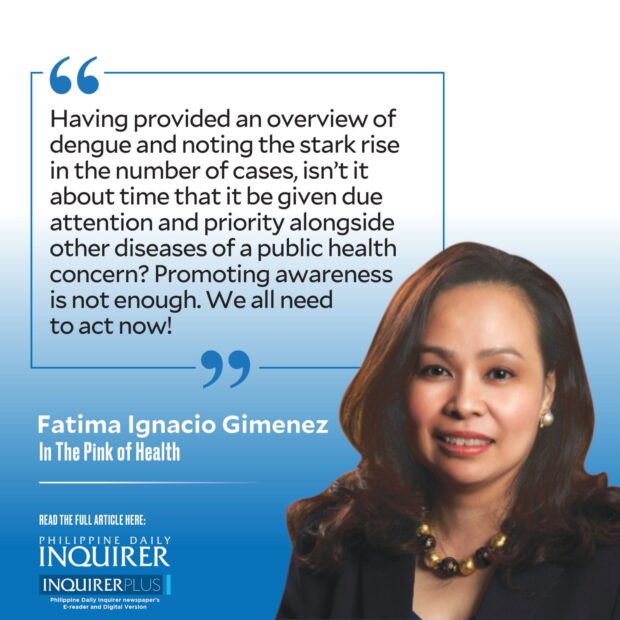Mosquitoes repel
On April 21, 1998, the late President Fidel Ramos by virtue of Proclamation No. 1204 declared June as National Dengue Awareness Month. As of June 8, 2023, according to the website of the European Center for Disease Prevention and Control, a total of 2,162,214 cases and 974 dengue deaths have been reported globally, with the Philippines ranking second among Asian countries. From the report of the Epidemiology Bureau of the Department of Health from Jan. 1 to May 20, 2023, there has been a total of 51,323 dengue cases from 39,620 cases, an increase of 30 percent when compared to the same period from last year, and a total number of 176 deaths from dengue. The National Capital Region (NCR) had the most number of cases reported, but the greatest increase in incidence was in Mimaropa (Mindoro Oriental and Occidental, Marinduque, Romblon, and Palawan), and most deaths were from this region.
From the statistics cited above, one wonders if numbers are enough to impress. How much of a sting does it hold? Dengue continues to be a public health threat from the lack of effective interventions that could prevent and control the spread which could decrease both morbidity and mortality from the disease. Currently, a national program is in place but moving forward to stem the growing problem involves a multipronged and concerted approach from all stakeholders who should be seriously invested and accountable.
Dengue briefer. Dengue is a self-limiting viral disease acquired from a bite of an infected female mosquito. Focus on the words infected and female. Two species primarily the Aedes aegypti and Aedes albopictus are the ones more commonly involved, hence dengue may occur in places where they are present. The virus is acquired from a blood meal from an infected human. Infection may occur more than once since there are four serotypes and immunity is type specific. Regarded as a pediatric disease with most occurring in those less than 15 years of age, adolescents and adults may also be affected with the elderly with comorbidities at a greater risk for mortality. Though a majority are asymptomatic, when apparent, symptoms are nonspecific and include any of the following: fever of more than 24 hours, headache, eye pain, muscle or joint pains, nausea, vomiting, and rash. Some may experience hemorrhagic manifestations that may lead to shock or even death. Warning signs necessitating immediate consult include persistent vomiting, severe abdominal pain, lethargy, restlessness or irritability, bleeding from the gums or nose, blood in vomitus or stools, or lack of urine output in the last six hours.
Preventive measures. Currently in the absence of a cure and an effective vaccine, one need not be a health-care professional to contribute to the prevention of dengue. The only thing that is required is to be more proactive in implementing strategies known as 5S, which among its various benefits, assists in limiting interaction between the vector and the host.
Knowing that mosquitoes are the culprit, you can help cut the propagation of the species by searching and destroying breeding sites. In short, keep your environment clean. Prevent them from seeking you out as their next free meal by wearing light-colored clothing, using insect repellants, or providing screens in your homes or offices, to warn them that they are uninvited guests. If your area has been designated as a “hot spot,” support fogging activities. If suffering from symptoms, be sure to hydrate yourself with oral electrolyte solutions and fresh fruit juices. Sports drinks are not a recommended alternative. Partake of small frequent meals. Dark-colored food need not be avoided. Monitor your urine output and your temperature. In the advent of experiencing warning signs, seek early consult. Lowering body temperature in such a situation should not be regarded as being on the road to recovery. On the contrary, this is a sign that one is about to go into a critical phase with all its complications.
Having provided an overview of dengue and noting the stark rise in the number of cases, isn’t it about time that it be given due attention and priority alongside other diseases of a public health concern? Promoting awareness is not enough. We all need to act now!
[email protected]Disclaimer: The comments uploaded on this site do not necessarily represent or reflect the views of management and owner of Cebudailynews. We reserve the right to exclude comments that we deem to be inconsistent with our editorial standards.

